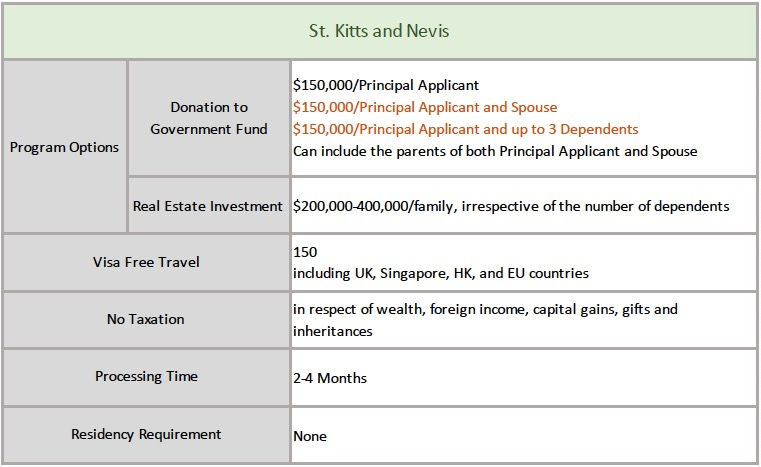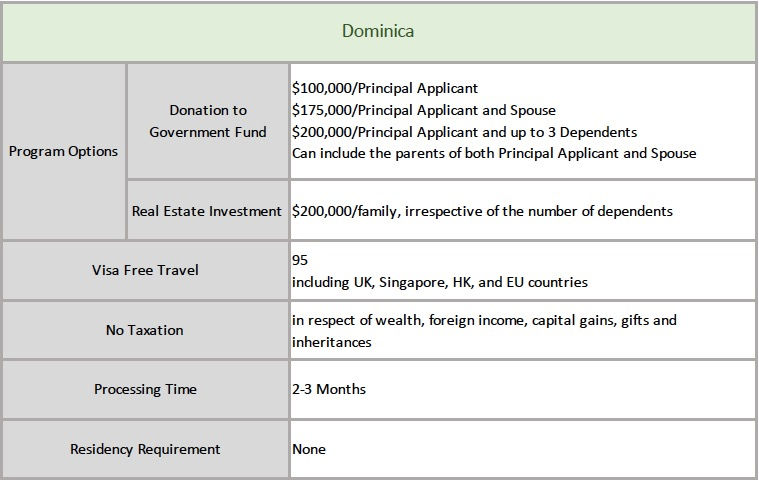Citizenship By Investment Programs in Caribbean Countries
- DeHeng Immigration
- Jul 24, 2020
- 4 min read
Updated: Sep 26, 2020
As US-China relations have continued to deteriorate, the risk of holding a US green card has increased sharply for many people. How should "global citizens" respond to risks and optimize their immigration statuses and tax arrangements for upcoming years? The solution may lie in the citizenship programs of Caribbean countries, which can provide many with flexibility in both international travel and tax planning. There are five Caribbean countries offering Citizenship by Investment (CBI) programs: Saint Kitts, Grenada, Saint Lucia, Dominica, and Antigua and Barbuda. In the past 40 years, the Caribbean CBI programs have matured through development. They have now become a tool for risk management and global deployment for people from all over the world, providing them with greater flexibility in international travel and global tax planning. During the pandemic, two Caribbean countries - St. Kitts and St. Lucia - have made clear decisions to cut prices. St. Kitts has announced that from now until the end of 2020, its CBI program price will be reduced by 23%, and the amount of citizenship by government donations for a family has been reduced from the original US$195,000 to US$150,000. What are the Citizenship by Investment Programs of Caribbean Countries? Citizenship by Investment (CBI) is an opportunity to obtain the nationality of a country through donation or investment. St. Kitts is the first country in the Caribbean to set up a citizenship by investment program. In the 1980s, it began to directly issue passports to eligible applicants who donated or invested in the country. Now, more and more countries have launched CBI programs. The more popular ones belong to the five countries from the Caribbean, along with Cyprus and Malta in the European Union. We’ll be focusing on introducing the CBI programs of the five island countries in the Caribbean. They have the following common features:
An economical and affordable investment. The minimum requirement for citizenship applications of a family through donations is only $100,000 US dollars;
Visa free travel. Being Commonwealth countries, their citizens can enter more than one hundred countries visa-free, bringing flexibility to those who need a global presence;
No taxation on personal income, capital gains, foreign income, inheritance, gifts or wealth allowing for convenient and effective wealth management;
Simple and fast processing. Generally 2-4 months after submission of documents, and once approved there is no residence requirement.
Details of CBI programs in the Five Caribbean Countries Below, we have compiled a detailed list of the CBI programs in these five countries, including investment or donation options, the number of visa-free countries, taxation, application processing time, and residence requirements.

St. Kitts was the first country in the Caribbean to set up a CBI program, which has been around for nearly 40 years. Due to the current epidemic affecting the local tourism industry, in order to maintain economic development, St. Kitts announced that as of December 31, 2020, the price of CBI through government donation for a family has been reduced from the original US$195,000 to US$150,000.

The CBI program in Grenada has particular advantages, because citizens of Grenada are eligible to apply for an E-2 work visa in the United States. E-2 is a US work visa allowing a treaty country citizen to live and work in the US when investing a substantial amount of capital in a U.S. business. Once obtained, the E-2 visa is generally valid for two years, but as long as the investor’s company operates normally, it can be extended indefinitely. Therefore, if you do not want to hold a green card in the US, but want to work and live in the United States in the future or let your children study in the US, this is a worthy option.

Saint Lucia's CBI program started in 2015 and has been favored by high-net-worth individuals in recent years. Due to the epidemic, Saint Lucia announced that as of December 31, 2020, it has reduced its government bond investment by 50%, which comes out to US$250,000 for individuals and US$300,000 for four-person families.

The CBI Program in Dominica is a long-standing program established in 1993. It has its legal foundations in the country’s Constitution. Under the program, one can apply for citizenship either through real estate investment or through a donation. In return, the applicant is granted lifetime citizenship for Dominica.

The amount of Antigua and Barbuda’s CBI program through government donation is currently the lowest among the Caribbean countries. A family of four members can obtain citizenship with a donation of US$100,000. This may be related to the damage caused by the hurricane at the end of 2017. With the help of many parties around the world, the local economy has been steadily recovering.
Takeaway
The advantages of the CBI programs in Caribbean countries are affordable prices, fast processing, and high success rates, with a resulting flexibility in travel and taxation to the citizens.
On the other hand, the economic development of these countries mainly depends on the tourism, and citizens through CBI usually do not choose to live in the country for long periods of time. If you are considering investing in real estate or other commercial projects in island countries, you will need to carefully investigate the projects.
Comments